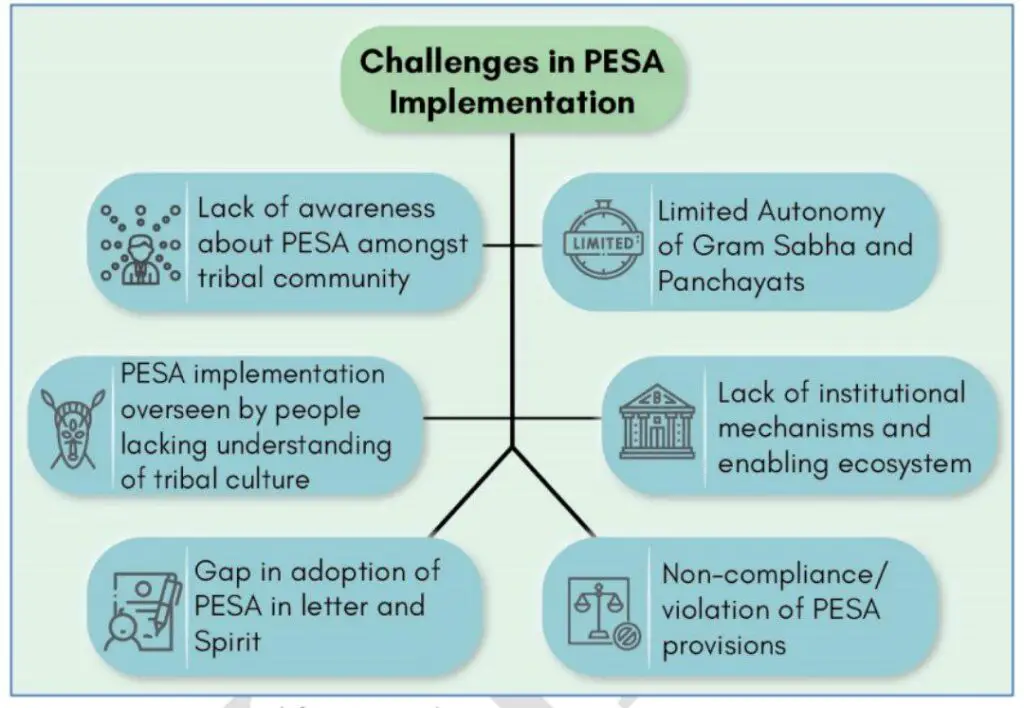PESA Act-
The Panchayats (Extension to the Scheduled Areas) Act, commonly known as the PESA Act, was established to empower self-governance via Gram Sabhas, village assemblies in Scheduled Areas. This legislation not only upholds the right of tribal communities residing in these areas to administer their affairs through indigenous self-governing structures but also validates their age-old entitlements to natural resources.
PESA Act, 1996 An Official Document
PESA Act: Empowering Tribal Areas

PESA Act and Its Significance:
- Article 243M of the Indian Constitution excludes Fifth Schedule areas from Part IX, commonly known as Panchayati Raj. However, it grants the Parliament the authority to extend these provisions to Scheduled and Tribal Areas through law without amending the Constitution.
- The PESA Act of 1996, based on recommendations from the Dileep Singh Bhuria Committee, was enacted to empower tribal communities and integrate them into the national mainstream.
- Often referred to as a ‘Constitution within the Constitution,’ the PESA Act extends the Panchayati Raj provisions (Part IX) of the Constitution to the Fifth Schedule areas of ten States under Article 244, with some adjustments and exceptions.
- The Ministry of Panchayati Raj is responsible for implementing the provisions of the PESA Act.
Key Provisions of the PESA Act:
- To promote local self-governance and participatory democracy in Fifth Schedule areas, the PESA Act mandates that all State Panchayati Raj Acts adhere to customary law, social and religious practices, and traditional resource management practices of the community.
- It requires each village to establish a separate Gram Sabha composed of individuals listed in the electoral rolls for the village-level Panchayat.
- The Gram Sabha’s role is to protect and preserve community traditions, customs, cultural identity, community resources, and customary dispute-resolution methods.
- The Act calls for reserving Panchayat seats proportionate to the community’s population (at least 50%), with reserved Chairperson seats at all levels for Scheduled Tribes (STs).
- The Gram Sabhas are entrusted with approving development projects in the village, identifying beneficiaries, and issuing certificates for fund utilization.
Challenges and Limitations of the PESA Act:
- While the PESA Act has made commendable contributions to advancing tribal communities’ livelihoods, its implementation faces several challenges. Some states’ lacklustre response to the Act exacerbates these issues. Challenges include:
- Delay in framing PESA Rules in significant tribal states like Jharkhand, Chhattisgarh, Madhya Pradesh, and Odisha.
- The use of unfair means to circumvent the law, such as land acquisition under different acts, thereby violating PESA’s intent to safeguard tribal land and require consent from Gram Sabhas.
- Poor implementation of the law, as highlighted by a 2010 study conducted by the Indian Institute of Public Administration (IIPA) in Andhra Pradesh, Gujarat, Chhattisgarh, Jharkhand, and Odisha.
The Way Forward:
- Implement Municipalities Extension to the Scheduled Areas (MESA), as recommended by the Bhuria Committee, to extend the provisions of the 73rd and 74th amendments to urban tribal areas.
- Expedite the framing of PESA Rules in states that are yet to do so and implement them based on the Ministry of Panchayati Raj model rules from 2009.
- Converge the provisions of the PESA Act with other regulations, including the Forest Rights Act of 2006 and the Right to Fair Compensation and Transparency in Land Acquisition, Rehabilitation, and Resettlement Act of 2013. This convergence aims to protect tribal rights and culture.
- Explore new modes of tribal community development to address emerging challenges and further empower tribal populations in Fifth Schedule areas.
The PESA Act plays a vital role in tribal empowerment and preserving their unique identity and traditions. Strengthening its implementation is essential for the well-being of these communities.


